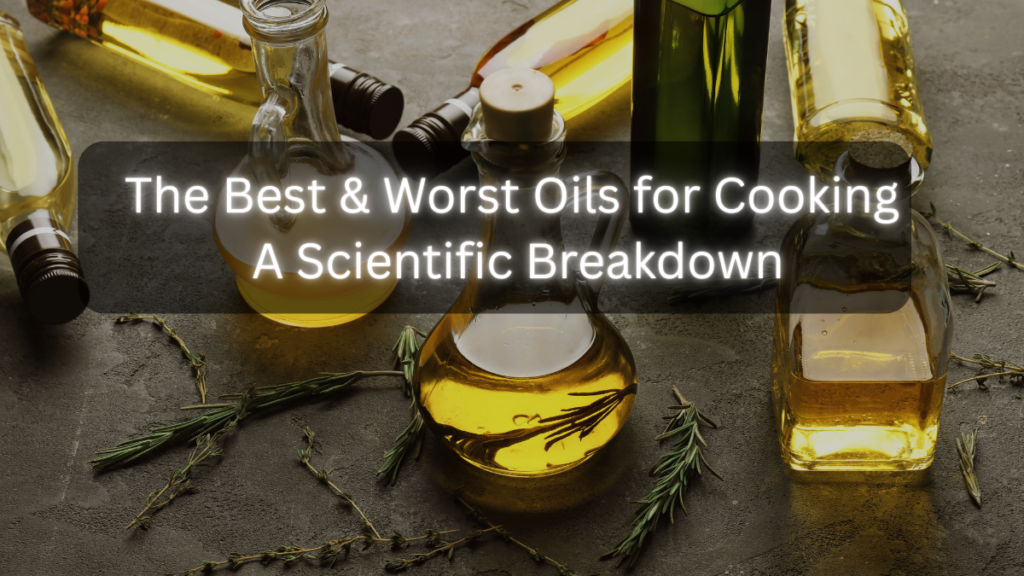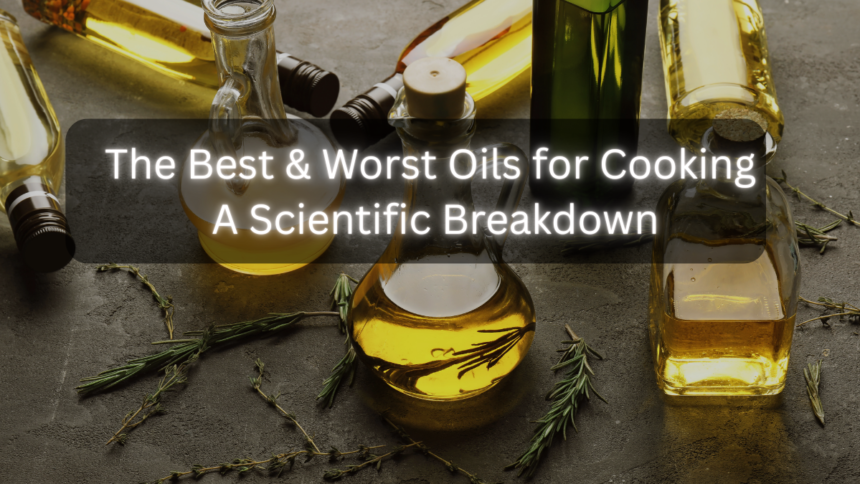Best and Worst Oils for Cooking
Cooking oils are a kitchen staple, but not all oils are created equal. Some can boost your health, while others might do more harm than good. With so many options lining grocery store shelves—olive, coconut, canola, avocado—how do you know which ones to cook with and which to avoid?
In this guide, we’ll break down the science behind cooking oils, ranking the best and worst based on smoke points, fatty acid composition, and health impacts. Whether you’re frying, sautéing, or drizzling, choosing the right oil can make a big difference in both flavor and nutrition.

Why Your Cooking Oil Choice Matters
Not all fats are bad—some are essential for brain function, hormone production, and nutrient absorption. However, the wrong oil can oxidize at high heat, creating harmful compounds linked to inflammation and chronic disease.
Key factors to consider when choosing an oil:
- Smoke point – The temperature at which oil starts to break down and smoke.
- Fatty acid profile – Oils high in polyunsaturated fats (like vegetable oils) are less stable, while monounsaturated and saturated fats handle heat better.
- Processing method – Cold-pressed, unrefined oils retain more nutrients than heavily processed ones.
Now, let’s dive into the best and worst oils for cooking.
Video Credits
The Best Oils for Cooking (Healthiest Choices)
1. Extra Virgin Olive Oil (EVOO)
- Best for: Low to medium-heat cooking, dressings, drizzling
- Smoke point: 325–375°F (165–190°C)
- Why it’s great: Rich in heart-healthy monounsaturated fats and antioxidants like polyphenols. Linked to reduced inflammation and better heart health.
Tip: Use EVOO for sautéing and baking, but avoid deep-frying with it.
2. Avocado Oil
- Best for: High-heat cooking, grilling, frying
- Smoke point: 520°F (270°C)
- Why it’s great: High in monounsaturated fats and vitamin E, with a neutral flavor. Great for searing and roasting.
3. Coconut Oil (Unrefined)
- Best for: Medium-heat cooking, baking
- Smoke point: 350°F (177°C)
- Why it’s great: Contains lauric acid, which may support metabolism. Best for low to medium-heat cooking.
Tip: Refined coconut oil has a higher smoke point (450°F) but fewer nutrients.
4. Ghee (Clarified Butter)
- Best for: High-heat cooking, frying
- Smoke point: 485°F (252°C)
- Why it’s great: Lactose-free and rich in butyrate, which supports gut health. Adds a rich, nutty flavor.
The Worst Oils for Cooking (Avoid These!)
1. Vegetable & Seed Oils (Soybean, Corn, Canola, Sunflower)
- Why they’re bad: Highly processed, often chemically extracted, and high in unstable polyunsaturated fats (PUFAs). When heated, they oxidize easily, forming harmful compounds.
- Linked to: Inflammation, heart disease, and oxidative stress.
Tip: If you must use them, opt for cold-pressed versions and avoid high-heat cooking.
2. Hydrogenated Oils (Margarine, Shortening)
- Why they’re bad: Contain trans fats, which are artificially created to extend shelf life. Strongly linked to heart disease and bad cholesterol (LDL).
3. Grapeseed Oil
- Why it’s questionable: Marketed as healthy but highly processed and prone to oxidation. Better alternatives exist (like avocado or olive oil).
How to Choose the Right Oil for Different Cooking Methods
| Cooking Method | Best Oil Choices |
|---|---|
| Low-heat (Sautéing, Dressings) | Extra virgin olive oil, flaxseed oil |
| Medium-heat (Stir-frying, Baking) | Coconut oil, unrefined sesame oil |
| High-heat (Frying, Grilling) | Avocado oil, ghee, refined coconut oil |
Final Thoughts: Making Smarter Oil Choices
Picking the right cooking oil isn’t just about taste—it’s about health. Stick with stable, minimally processed oils like extra virgin olive oil, avocado oil, and ghee for most cooking needs. Avoid vegetable oils, margarine, and hydrogenated fats, which can harm your health over time.
Pro Tip: Store oils in a cool, dark place to prevent rancidity, and always check expiration dates!
What’s Your Go-To Cooking Oil?
Do you have a favorite oil for cooking? Share your thoughts in the comments below! And if you found this guide helpful, don’t forget to share it with a friend or subscribe for more science-backed nutrition tips.











